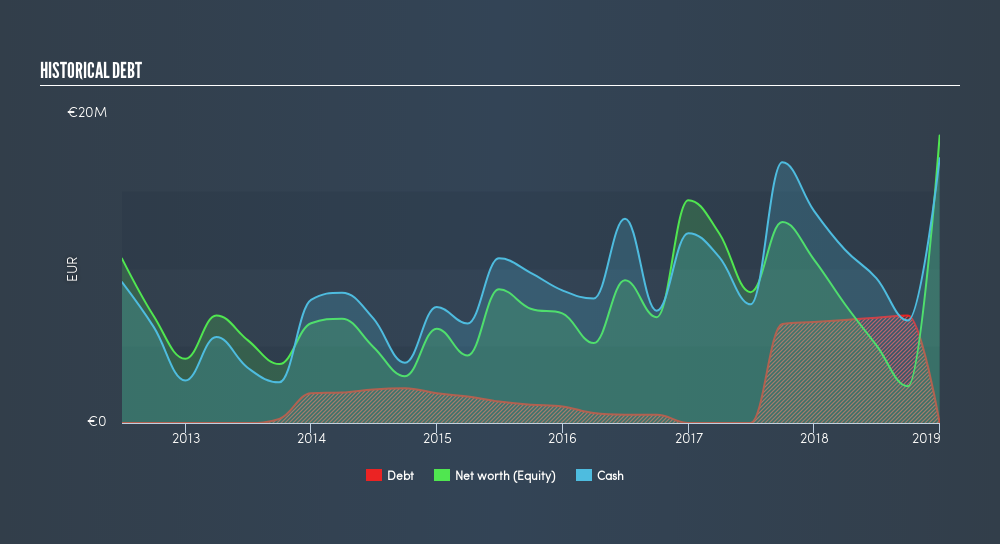If You Had Bought Epigenomics (FRA:ECX) Stock Three Years Ago, You'd Be Sitting On A 63% Loss, Today

Want to participate in a short research study? Help shape the future of investing tools and you could win a $250 gift card!
If you love investing in stocks you're bound to buy some losers. But the long term shareholders of Epigenomics AG (FRA:ECX) have had an unfortunate run in the last three years. Regrettably, they have had to cope with a 63% drop in the share price over that period. The more recent news is of little comfort, with the share price down 46% in a year. The good news is that the stock is up 5.6% in the last week.
View our latest analysis for Epigenomics
With just €1,533,000 worth of revenue in twelve months, we don't think the market considers Epigenomics to have proven its business plan. This state of affairs suggests that venture capitalists won't provide funds on attractive terms. As a result, we think it's unlikely shareholders are paying much attention to current revenue, but rather speculating on growth in the years to come. It seems likely some shareholders believe that Epigenomics has the funding to invent a new product before too long.
As a general rule, if a company doesn't have much revenue, and it loses money, then it is a high risk investment. There is usually a significant chance that they will need more money for business development, putting them at the mercy of capital markets. So the share price itself impacts the value of the shares (as it determines the cost of capital). While some such companies do very well over the long term, others become hyped up by promoters before eventually falling back down to earth, and going bankrupt (or being recapitalized). It certainly is a dangerous place to invest, as Epigenomics investors might realise.
Epigenomics had net cash of €14m when it last reported (December 2018). That's not too bad but management may have to think about raising capital or taking on debt, unless the company is close to breaking even. We'd venture that shareholders are concerned about the need for more capital, because the share price has dropped 28% per year, over 3 years. The image below shows how Epigenomics's balance sheet has changed over time; if you want to see the precise values, simply click on the image.

It can be extremely risky to invest in a company that doesn't even have revenue. There's no way to know its value easily. Would it bother you if insiders were selling the stock? I'd like that just about as much as I like to drink milk and fruit juice mixed together. You can click here to see if there are insiders selling.
What about the Total Shareholder Return (TSR)?
We'd be remiss not to mention the difference between Epigenomics's total shareholder return (TSR) and its share price return. The TSR is a return calculation that accounts for the value of cash dividends (assuming that any dividend received was reinvested) and the calculated value of any discounted capital raisings and spin-offs. We note that Epigenomics's TSR, at -61% is higher than its share price return of -63%. When you consider it hasn't been paying a dividend, this data suggests shareholders have benefitted from a spin-off, or had the opportunity to acquire attractively priced shares in a discounted capital raising.
A Different Perspective
Epigenomics shareholders are down 43% for the year, falling short of the market return. Meanwhile, the broader market slid about 3.0%, likely weighing on the stock. The three-year loss of 27% per year isn't as bad as the last twelve months, suggesting that the company has not been able to convince the market it has solved its problems. Although Warren Buffett famously said he likes to 'buy when there is blood on the streets', he also focusses on high quality stocks with solid prospects. You might want to assess this data-rich visualization of its earnings, revenue and cash flow.
If you like to buy stocks alongside management, then you might just love this freelist of companies. (Hint: insiders have been buying them).
Please note, the market returns quoted in this article reflect the market weighted average returns of stocks that currently trade on DE exchanges.We aim to bring you long-term focused research analysis driven by fundamental data. Note that our analysis may not factor in the latest price-sensitive company announcements or qualitative material.
If you spot an error that warrants correction, please contact the editor at editorial-team@simplywallst.com. This article by Simply Wall St is general in nature. It does not constitute a recommendation to buy or sell any stock, and does not take account of your objectives, or your financial situation. Simply Wall St has no position in the stocks mentioned. Thank you for reading.
Market Insights
Community Narratives





